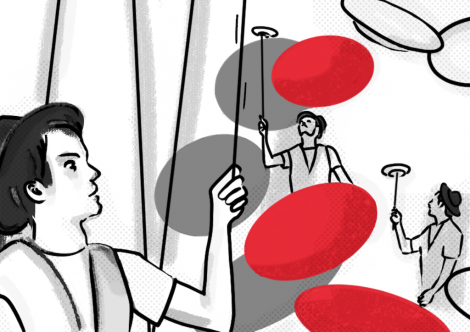You do (not) get wise from mistakes

Making mistakes seems to be modern and hip. Events such as Fuckup nights, failure summits and FailCons celebrate failure and making mistakes as the learning opportunity par excellence. Making mistakes suddenly becomes a success. Is that really the case?
Sending the mail to the customer with the wrong offer, a twisted number in budget planning bursts an important project, a coding error suddenly leaves customer data unprotected – errors can have enormous consequences. At present, however, they are largely glorified because people (allegedly) can learn so much from them. Is it really worth making mistakes?
For work processes, errors can never be completely avoided and are ultimately inherent in the work process (cf. van Dyck et al., 2005).
This is not a reason to celebrate and has an impact not only on the organisation, but also directly on the employees. Therefore, errors can lead to human and economic costs (cf. Zapf et al., 1992).
Mistakes affect the self-esteem, accompanied by negative feelings such as fear of negative evaluation or punishment and consequently lead to strain. The authors Scheel and Hausmann (2013) investigated the relation with error culture in the field of knowledge work and the negative effects of errors. Furthermore, mistakes can be perceived as exhaustive, as they interfere with targeted behaviour and thus with the actual achievement of a goal. The additional expectation of being sanctioned for a mistake increases these negative effects and usually ends up in strain (cf. Zapf et al., 1992).
We are trained to avoid mistakes
Socialization in the Western world continues to focus on error prevention. At school we already learn that “right” or “wrong” matters. Our education system is focused on performance and the ever-increasing pressure to perform does not encourage us to make generous mistakes. Strong hierarchies in companies are at odds with the good old “mistakes make you wise” (cf. Lipowsky, 2015).
However: A strong error avoidance behaviour inhibits creativity, innovation and learning. In an economic and dynamic world such as VUCA, these competencies are critical for success. For those who do not constantly improve and develop their competencies it might get more difficult in the future. This is particularly true in highly knowledge- and innovation-driven work areas.
Lipowsky (2015) shows in his meta-study “Error culture and self-regulation” that an open error culture has a positive effect on the individual and the organization. It is combined with better performance and greater effectiveness, cooperation is strengthened, and a climate of better mutual exchange and understanding is created. On the individual level, the ability for effective self-regulation is promoted.
Self-regulation describes our handling of feelings, impulses and actions as well as their purposeful, deliberate control. This also includes the ability to subordinate short-term goals and needs to long-term goals. A prerequisite for positive or successful self-regulation is the ability to reflect on oneself and one’s own thinking – called metacognition.
Self-regulation and metacognition represent important competencies for people who work in environments characterised by a high degree of personal responsibility, self-control, complexity and high pressure to change. Knowledge workers, developers and managers who design and make decisions in agile environments are examples of this (cf. Schmidt, 2007).
The efficiency in self-regulation is particularly reduced by stress factors associated with negative emotions that are grouped together as a threat. Especially in creative work contexts, the fear of making a mistake is critical. It leads to an inhibition of abilities and thus also prevents success at work (cf. Weingardt, 2004).
How do you make sense of mistakes?
Self-regulation and the ability to reflect one’s own thinking are fundamental prerequisites for our learning. Stress factors such as fear and further negative feelings naturally have a negative effect on our ability to regulate ourselves and prevent us from learning and creative thinking (cf. Bandura, 1990).
Therefore, Lipowsky (2015) concludes from the results of the meta-study that the basis for effective self-regulation for employees in the company is a living culture of error.
From an error culture to a learning culture
Mistakes – not their avoidance – provide opportunities for learning and reflection.
One can stretch the bow here with pleasure further: From a culture of mistakes to a culture of learning that establishes and supports reflection spaces and processes, that allows a future-oriented dialogue and reinterprets mistakes as learning opportunities. Less celebrating mistakes and failures – but focusing on the chance of learning for the future. Then cooperation becomes wise out of mistakes and the organisation grows with them.
Sources:

